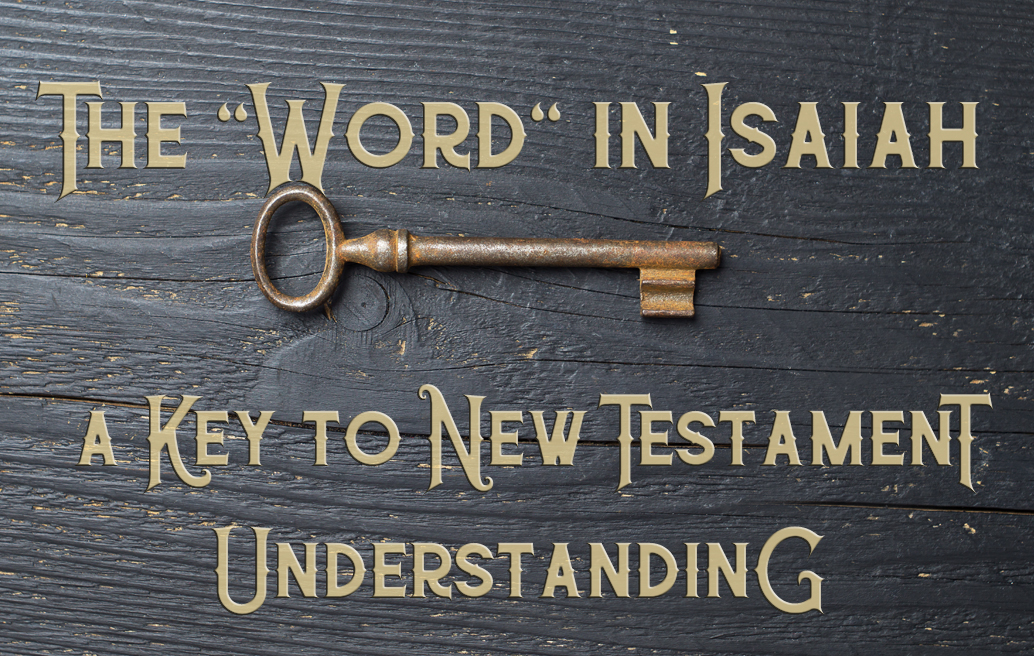The ''Word'' in Isaiah: A Key to New Testament Understanding
|
This is a non-WLC article. When using resources from outside authors, we only publish the content that is 100% in harmony with the Bible and WLC current biblical beliefs. So such articles can be treated as if coming directly from WLC. We have been greatly blessed by the ministry of many servants of Yahuwah. But we do not advise our members to explore other works by these authors. Such works, we have excluded from publications because they contain errors. Sadly, we have yet to find a ministry that is error-free. If you are shocked by some non-WLC published content [articles/episodes], keep in mind Proverbs 4:18. Our understanding of His truth is evolving, as more light is shed on our pathway. We cherish truth more than life, and seek it wherever it may be found. |

“The reason why John chose to call the...Son by the title Logos has caused much research. It is generally assumed that there is a Greek background (logos was a prominent concept in metaphysical philosophy) and a Hebrew background (for the word of Yahuwah is virtually personified in parts of the OT — e.g., Prov. 8).”1
In understanding the Hebrew background of the “word” in the Old Testament and why John chose to use that concept for the Messiah, Isaiah is particularly helpful. The prophet provides quite a detailed description of the “word of Yahuwah.”
|
In understanding the Hebrew background of the “word” in the Old Testament and why John chose to use that concept for the Messiah, Isaiah is particularly helpful. The prophet provides quite a detailed description of the “word of Yahuwah.” And since the New Testament writers often draw from Isaiah, it is enlightening to read his concept of “the word” into their writings, especially John’s gospel.
The very early chapters of Isaiah contain “the word” in its typical Old Testament sense, as Yahuwah’s instruction or law. The synonymous parallelism of both Isaiah 2:3 and 5:24 define “the word of Yahuwah” as His law. The last two lines of 2:3 read: “For the law will go forth from Zion, and the word of the Lord from Jerusalem.” Similarly, Isaiah 1:10 defines “the word” as Yahuwah’s instruction: “Hear the word of the Lord, you rulers of Sodom; give ear to the instruction of our Yahuwah, you people of Gomorrah.” From these three passages, we could define “the word” as Yahuwah’s instruction or law.
However, in Isaiah 9:8, the concept of “the word” is expanded through personification. “The Lord sends a word against Jacob, and it falls on Israel.” Although here “word” can be translated “message,” one commentator suggests a more personal interpretation: “The word is both in nature and history the messenger of the Lord: it runs quickly through the earth, and when sent by the Lord, comes to men to destroy or to heal, and never returns to its sender void.”2 This description of the messenger can be compared to Christ. The “word” here is self-fulfilling; it has more personal power than a simple message or instruction.
“The grass withers, the flower fades, but the word of our Yahuwah stands forever” (Isa. 40:8). One commentator paraphrases this verse: “Man and his power are but transitory, whereas the word, the proclaimed purpose, of Yahuwah endures forever.”3 The “proclaimed purpose” in the context suggests especially the good news of the revealing of the glory of the Lord. Here Isaiah illustrates what is thought to be an exclusively New Testament concept of the word as the message of the kingdom. Another commentator interprets this passage:
“Men living in the flesh are universally impotent, perishing, limited; Yahuwah, on the contrary, is the omnipotent, eternal, all-determining; and like Himself, so is His word, which, regarded as the vehicle and utterance of His willing and thinking, is not something separate from Himself, and therefore is the same as He.”4
It is interesting that both of these commentators, in expounding Isaiah, have clarified John 1:1. In the beginning was the Word — “Yahuwah’s proclaimed purpose” or “the vehicle and utterance of His willing and thinking” — and this word was with Yahuwah, and was “the same as He.” This word became flesh in Yahushua.
In personifying “the word,” Isaiah makes clear that it is more than simply communication, instruction or law. Instead, he illustrates that “An utterance was looked upon by the Hebrews almost as a personal power fulfilling itself.”
|
Isaiah 45:23 and 55:11 are similar to each other in their description of “the word of Yahuwah.” Both explain that it has gone forth from Yahuwah’s mouth in righteousness, and will not turn back. “It shall not return to Me empty, without accomplishing what I desire, and without succeeding in the matter for which I sent it” (55:11). Yahushua, the ultimate personification of “the word” did not ascend to Yahuwah without succeeding in accomplishing Yahuwah’s desire for Him. One commentator’s explanation of “the word” here also perfectly describes Christ:
“As it goes forth out of the mouth of Yahuwah it acquires shape, and in this shape is hidden a divine life, because of its divine origin; and so it runs, with life from Yahuwah, endowed with divine power, supplied with divine commissions, like a swift messenger through nature and the world of man, there to melt the ice, as it were, and here to heal and to save; and does not return from its course till it has given effect to the will of the sender. This return of the word to God also presupposes its divine nature.”5
In personifying “the word,” Isaiah makes clear that it is more than simply communication, instruction or law. Instead, he illustrates that “An utterance was looked upon by the Hebrews almost as a personal power fulfilling itself.”6 And so Isaiah aids in understanding “the word” in John 1:1 as Yahuwah’s self-fulfilling personal power, which became flesh in Yahushua and accomplished Yahuwah’ s purpose.
1 Merrill Tenney, ed., The New International Dictionary of the Bible, Grand Rapids: Zondervan, 1987, p. 1069.
2 F. Delitzsch and C.F. Keil, Commentary on the Old Testament, Peabody, MA: Hendrickson, 1989, p. 256.
3 Arthur Peake, ed., A Commentary on the Bible, London: Thomas Nelson and Sons, 1919, p. 461.
4 Keil and Delitzsch, p. 143.
5 Ibid., p. 359.
6 Peake, p. 468.
This is a non-WLC article written by Sarah Buzzard.
We have taken out from the original article all pagan names and titles of the Father and Son, and have replaced them with the original given names. Furthermore, we have restored in the Scriptures quoted the names of the Father and Son, as they were originally written by the inspired authors of the Bible. -WLC Team








